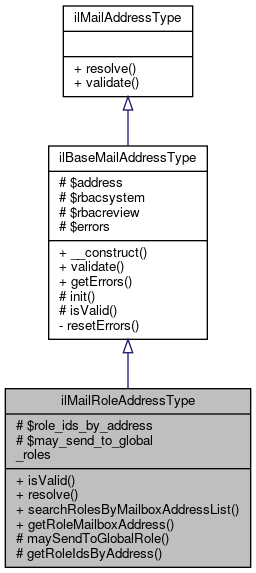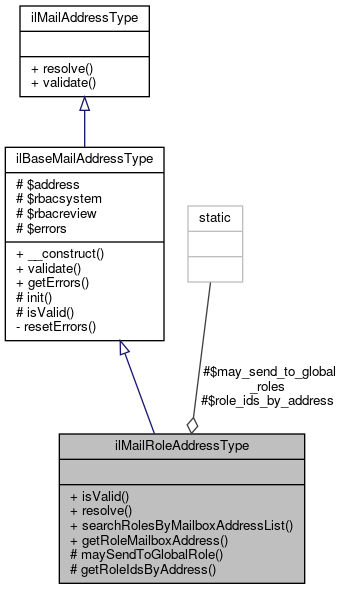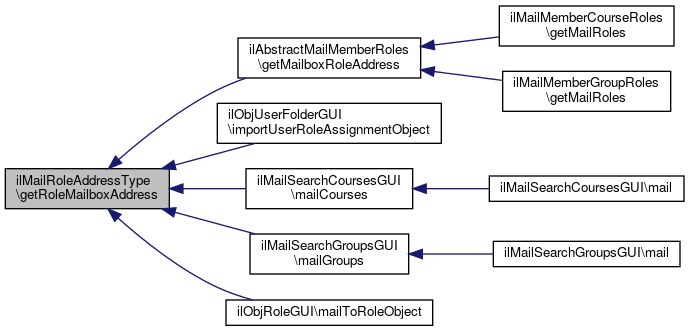Class ilMailRoleAddressType. More...
 Inheritance diagram for ilMailRoleAddressType:
Inheritance diagram for ilMailRoleAddressType: Collaboration diagram for ilMailRoleAddressType:
Collaboration diagram for ilMailRoleAddressType:Public Member Functions | |||
| isValid ($a_sender_id) | |||
{
| |||
| resolve () | |||
{Returns an array of resolved user ids.
| |||
 Public Member Functions inherited from ilBaseMailAddressType Public Member Functions inherited from ilBaseMailAddressType | |||
| __construct (\ilMailAddress $a_address) | |||
| ilBaseMailAddressType constructor. More... | |||
| validate ($a_sender_id) | |||
{
| |||
| getErrors () | |||
| resolve () | |||
| Returns an array of resolved user ids. More... | |||
| validate ($a_sender_id) | |||
Static Public Member Functions | |
| static | searchRolesByMailboxAddressList ( $a_address_list, ilMailRfc822AddressParserFactory $parserFactory=null, ilMailRfc822AddressParser $parser=null) |
| Finds all role ids that match the specified user friendly role mailbox address list. More... | |
| static | getRoleMailboxAddress ( $a_role_id, $is_localize=true, ilMailRfc822AddressParserFactory $mailAddressParserFactory=null) |
| Returns the mailbox address of a role. More... | |
Protected Member Functions | |
| maySendToGlobalRole ($a_sender_id) | |
 Protected Member Functions inherited from ilBaseMailAddressType Protected Member Functions inherited from ilBaseMailAddressType | |
| init () | |
| isValid ($a_sender_id) | |
Static Protected Member Functions | |
| static | getRoleIdsByAddress (ilMailAddress $a_address) |
Static Protected Attributes | |
| static | $role_ids_by_address = array() |
| static | $may_send_to_global_roles = array() |
Additional Inherited Members | |
 Protected Attributes inherited from ilBaseMailAddressType Protected Attributes inherited from ilBaseMailAddressType | |
| $address | |
| $rbacsystem | |
| $rbacreview | |
| $errors = array() | |
Detailed Description
Class ilMailRoleAddressType.
Definition at line 13 of file class.ilMailRoleAddressType.php.
Member Function Documentation
◆ getRoleIdsByAddress()
|
staticprotected |
- Parameters
-
ilMailAddress $a_address
- Returns
- array
Definition at line 29 of file class.ilMailRoleAddressType.php.
References ilBaseMailAddressType\$address, ilMailAddress\getHost(), ilMailAddress\getMailbox(), and searchRolesByMailboxAddressList().
Referenced by isValid(), and resolve().
 Here is the call graph for this function:
Here is the call graph for this function: Here is the caller graph for this function:
Here is the caller graph for this function:◆ getRoleMailboxAddress()
|
static |
Returns the mailbox address of a role.
Example 1: Mailbox address for an ILIAS reserved role name
The il_crs_member_345 role of the course object "English Course 1" is returned as one of the following mailbox addresses:
a) Course Member <#member@[English Course 1]> b) Course Member <#il_crs_member_345@[English Course 1]> c) Course Member <#il_crs_member_345>
Address a) is returned, if the title of the object is unique, and if there is only one local role with the substring "member" defined for the object.
Address b) is returned, if the title of the object is unique, but there is more than one local role with the substring "member" in its title.
Address c) is returned, if the title of the course object is not unique.
Example 2: Mailbox address for a manually defined role name
The "Admin" role of the category object "Courses" is returned as one of the following mailbox addresses:
a) Course Administrator <#Admin@Courses> b) Course Administrator <#Admin> c) Course Adminstrator <#il_role_34211>
Address a) is returned, if the title of the object is unique, and if there is only one local role with the substring "Admin" defined for the course object.
Address b) is returned, if the title of the object is not unique, but the role title is unique.
Address c) is returned, if neither the role title nor the title of the course object is unique.
Example 3: Mailbox address for a manually defined role title that can contains special characters in the local-part of a
mailbox address
The "Author Courses" role of the category object "Courses" is returned as one of the following mailbox addresses:
a) "#Author Courses"@Courses b) Author Courses <#il_role_34234>
Address a) is returned, if the title of the role is unique.
Address b) is returned, if neither the role title nor the title of the course object is unique, or if the role title contains a quote or a backslash.
- Parameters
-
$a_role_id bool $is_localize is_localize whether mailbox addresses should be localized ilMailRfc822AddressParserFactory | null $mailAddressParserFactory
- Returns
- String mailbox address or null, if role does not exist.
Definition at line 357 of file class.ilMailRoleAddressType.php.
References $DIC, $domain, $parser, $query, $res, and $row.
Referenced by ilAbstractMailMemberRoles\getMailboxRoleAddress(), ilObjUserFolderGUI\importUserRoleAssignmentObject(), ilMailSearchCoursesGUI\mailCourses(), ilMailSearchGroupsGUI\mailGroups(), and ilObjRoleGUI\mailToRoleObject().
 Here is the caller graph for this function:
Here is the caller graph for this function:◆ isValid()
| ilMailRoleAddressType::isValid | ( | $a_sender_id | ) |
{
- Parameters
-
$a_sender_id integer
- Returns
- boolean
Reimplemented from ilBaseMailAddressType.
Definition at line 65 of file class.ilMailRoleAddressType.php.
References getRoleIdsByAddress().
 Here is the call graph for this function:
Here is the call graph for this function:◆ maySendToGlobalRole()
|
protected |
- Parameters
-
int $a_sender_id
- Returns
- bool
Definition at line 44 of file class.ilMailRoleAddressType.php.
References ilMailGlobalServices\getMailObjectRefId().
 Here is the call graph for this function:
Here is the call graph for this function:◆ resolve()
| ilMailRoleAddressType::resolve | ( | ) |
{Returns an array of resolved user ids.
- Returns
- int[]
Implements ilMailAddressType.
Definition at line 91 of file class.ilMailRoleAddressType.php.
References ilLoggerFactory\getLogger(), getRoleIdsByAddress(), and sprintf.
 Here is the call graph for this function:
Here is the call graph for this function:◆ searchRolesByMailboxAddressList()
|
static |
Finds all role ids that match the specified user friendly role mailbox address list.
The role mailbox name address list is an e-mail address list according to IETF RFC 822:
address list = role mailbox, {"," role mailbox } ; role mailbox = "#", local part, ["@" domain] ;
Examples: The following role mailbox names are all resolved to the role il_crs_member_123:
#Course.A #member@Course.A #il_crs_member_123@Course.A #il_crs_member_123 #il_crs_member_123@ilias
Examples: The following role mailbox names are all resolved to the role il_crs_member_345:
#member@[English Course] #il_crs_member_345@[English Course] #il_crs_member_345 #il_crs_member_345@ilias
If only the local part is specified, or if domain is equal to "ilias", ILIAS compares the title of role objects with local part. Only roles that are not in a trash folder are considered for the comparison.
If a domain is specified, and if the domain is not equal to "ilias", ILIAS compares the title of objects with the domain. Only objects that are not in a trash folder are considered for the comparison. Then ILIAS searches for local roles which contain the local part in their title. This allows for abbreviated role names, e.g. instead of having to specify #il_grp_member_345@MyGroup, it is sufficient to specify #member@MyGroup.
The address list may contain addresses thate are not role mailboxes. These addresses are ignored.
If a role mailbox address is ambiguous, this function returns the ID's of all role objects that are possible recipients for the role mailbox address.
If Pear Mail is not installed, then the mailbox address
- Parameters
-
$a_address_list ilMailRfc822AddressParserFactory | null $parserFactory ilMailRfc822AddressParser | null $parser
- Returns
- int[] Array with role ids that were found
Definition at line 179 of file class.ilMailRoleAddressType.php.
References ilBaseMailAddressType\$address, $DIC, $domain, $parser, $query, $res, $row, and ilMail\ILIAS_HOST.
Referenced by getRoleIdsByAddress(), and ilObjUserFolderGUI\importUserRoleAssignmentObject().
 Here is the caller graph for this function:
Here is the caller graph for this function:Field Documentation
◆ $may_send_to_global_roles
|
staticprotected |
Definition at line 23 of file class.ilMailRoleAddressType.php.
◆ $role_ids_by_address
|
staticprotected |
Definition at line 18 of file class.ilMailRoleAddressType.php.
The documentation for this class was generated from the following file:
- Services/Mail/classes/Address/Type/class.ilMailRoleAddressType.php









